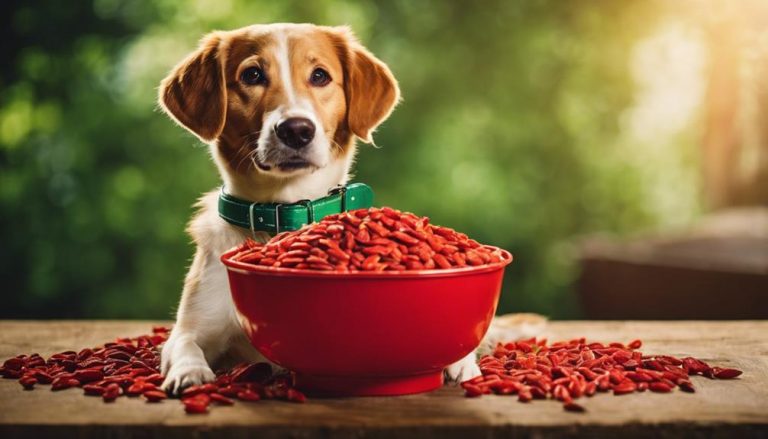Safe or Not: Dogs and Goji Berries
Goji berries, packed with vitamins A, B, C, and E, are great for dogs in small amounts. These vitamins help keep your dog healthy and support their immune system.
But since goji berries have a lot of fiber, you should add them to your dog’s meals bit by bit to prevent stomach upset. Watch out for any signs that your dog might not be reacting well to them. It’s a smart move to talk to your vet before you start giving your dog goji berries or any new food.
If done right, goji berries can be a healthy addition to your dog’s diet. It’s all about finding the right way to introduce these berries to make your dog’s meals even better.
Key Takeaways
- Goji berries are occasionally safe for dogs in small amounts.
- They boost health with vitamins and antioxidants.
- Slowly introduce to check for allergies or stomach issues.
Goji Berry Safety for Dogs
Goji berries offer health benefits for dogs due to their richness in vitamins A, B, C, and E. These nutrients are crucial for a dog’s overall well-being and immune support. Yet, it’s essential to introduce goji berries into your dog’s diet carefully. Because they contain a lot of fiber, eating too many can upset your dog’s stomach.
Always watch your dog for any signs of an allergic reaction or digestive issues after they eat goji berries. While these berries aren’t poisonous to dogs, it’s wise to talk to your vet before adding them or any new food to your pet’s meals. This ensures the food is suitable and won’t harm your furry companion.
Debunking Goji Berry Myths
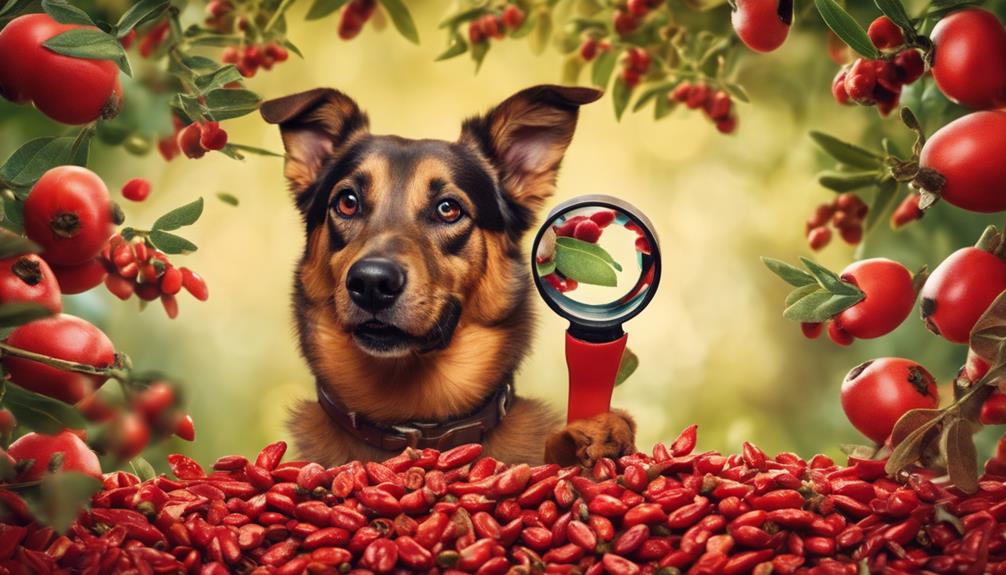
Despite common beliefs, research shows that goji berries are actually safe for dogs if given in moderation. They aren’t poisonous to our canine pals but can offer them nutritional perks. Goji berries are packed with nutrients that can be good for dogs, including antioxidants and vitamins, if they’re included in their diet the right way. However, it’s important to note that eating too many goji berries can cause stomach upset in dogs because of their high fiber content. So, keeping the portions small is the best way to prevent any digestive problems.
Before you start adding goji berries to your dog’s meals, talking to a vet is a smart move. This helps make sure it’s a safe addition to your pet’s diet. Dogs can safely enjoy the health benefits of goji berries when they’re fed properly and in the right amounts.
Introducing Goji to Dogs
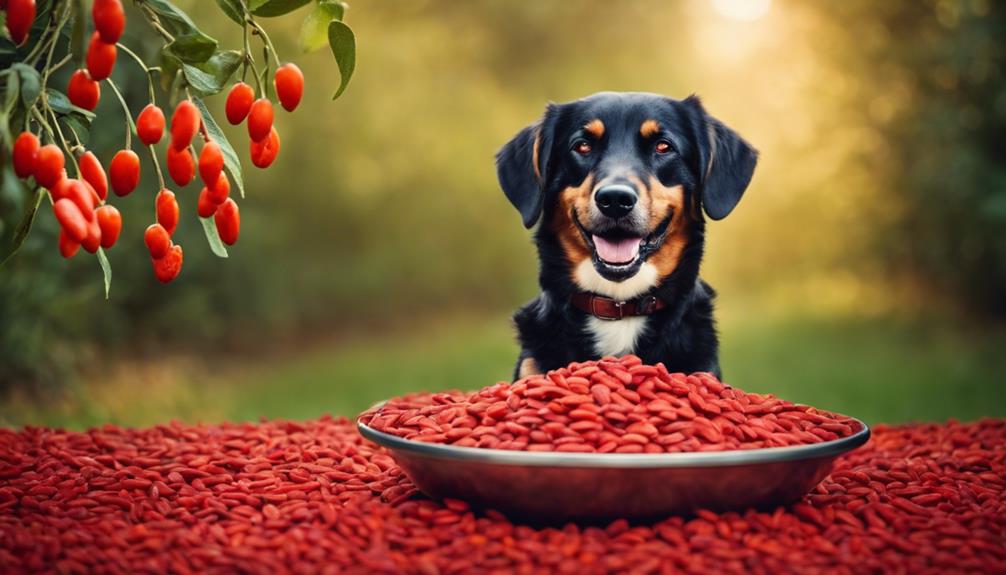
Introducing goji berries to your dog’s diet should be done with care. Begin with small amounts to see how they react and to avoid any digestive issues or allergic reactions.
- Keep an eye on your pet for any signs of discomfort or allergies after they eat goji berries.
- Start by giving them a tiny bit of the berries.
- Watch for good signs such as your dog staying energetic and having regular bowel movements.
- If your dog starts vomiting, has diarrhea, or becomes lethargic, it’s best to get advice from a vet.
- Ensure that goji berries and all other snacks make up no more than 10% of your dog’s daily food intake.
Adding goji berries to your dog’s meals needs to be done with caution to ensure they enjoy the benefits without any negative side effects.
Potential Canine Concerns
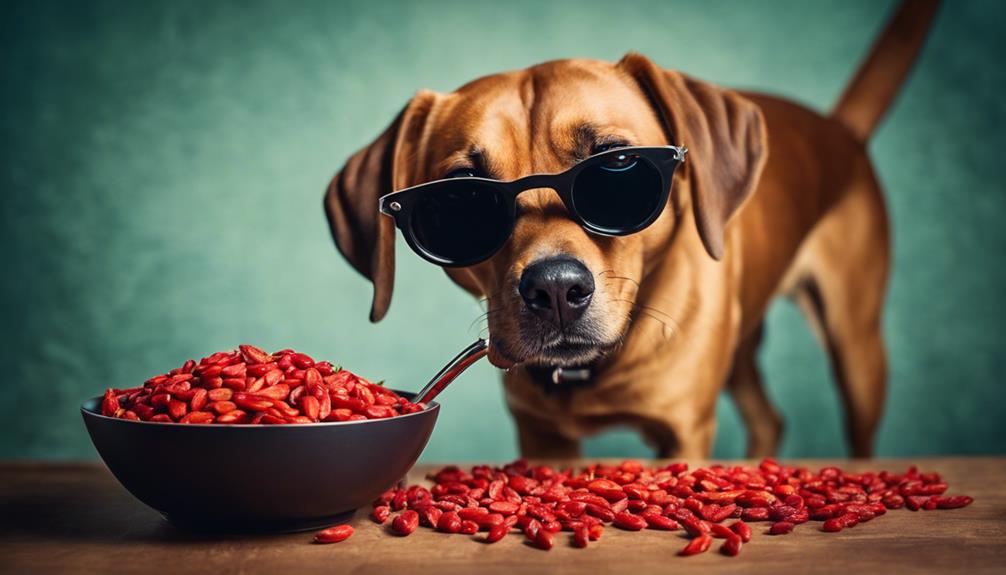
Goji berries are mostly safe for dogs, but allergic reactions can occur. These reactions may include sneezing, coughing, and excessive scratching, signaling your dog is uncomfortable. If you notice these symptoms, it’s essential to act quickly to avoid more serious health issues.
Goji berries should be an occasional treat, not a regular part of your dog’s diet. Eating too many can cause weight gain and digestive issues, so moderation is key to keeping your pet healthy.
Smart Snacking Tips

Adding goji berries to your dog’s meals as a healthy treat should be done with caution to prevent any negative effects. These berries are full of nutrients and can be beneficial for your dog’s health if given in the right amounts.
Keep an eye on how much goji berry you give to avoid upset stomachs. Watch your dog for any signs of allergies, such as sneezing or itching, when they try goji berries for the first time. It’s important that these treats, goji berries included, don’t make up more than 10% of your dog’s daily food. Always talk to your vet before adding goji berries to your pet’s diet. Opt for organic, unsweetened goji berries to steer clear of any harmful additives.
Following these steps ensures your dog can enjoy the health benefits of goji berries safely.
Superfood Alternatives
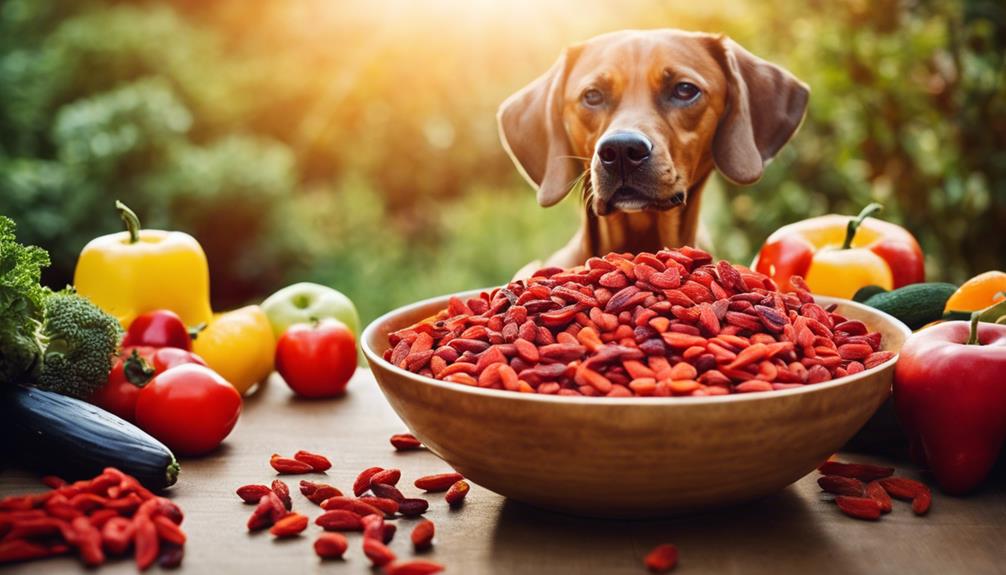
Exploring different foods like carrots, sweet potatoes, and blueberries can be great for your dog’s health. These foods are packed with vitamins, antioxidants, and other nutrients that are crucial for keeping your dog healthy and happy.
For instance, carrots are not just crunchy treats; they’re a source of Vitamin C and K, which can help with immune support and healing. Sweet potatoes, rich in beta-carotene and antioxidants, contribute to your dog’s overall health and have anti-inflammatory benefits.
Blueberries, with their phytochemicals and fiber, support digestive health and can even help prevent heart disease. When you include these foods in your dog’s diet, you’re not just feeding them; you’re contributing to a diet rich in omega-3 fatty acids, vitamin C, and anti-inflammatory properties. This is essential for warding off heart disease and ensuring they’re not just surviving on dried or processed snacks.
Introducing these nutrient-rich foods into your dog’s meals can make a big difference in their health. It’s a straightforward way to ensure they get a balanced diet, without the need for any complicated or expensive supplements. Plus, it’s an approach that keeps their meals interesting and flavorful, which any dog will love.
Frequently Asked Questions
Are Goji Berries Toxic to Dogs?
- Goji berries are safe for dogs in small amounts.
- Too much can upset their stomach.
- Always ask a vet before sharing human food with pets.
How Much Dried Goji Berries Can I Give My Dog?
- Serve goji berries sparingly, considering your dog’s size.
- Aim for eight berries, maybe twice weekly.
- Explore other treat options for variety.
What Berries Can Dogs Not Eat?
- Grapes and currants harm dogs.
- Cherries’ pits pose choking hazards.
- Avocados contain substances toxic to dogs.
Can You Eat Raw Dried Goji Berries?
- Goji berries are nutritious and versatile.
- Store properly for peak freshness.
- Rich in antioxidants for health.

